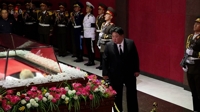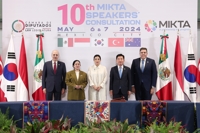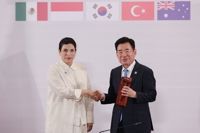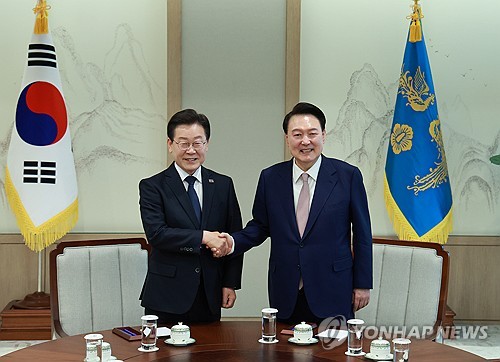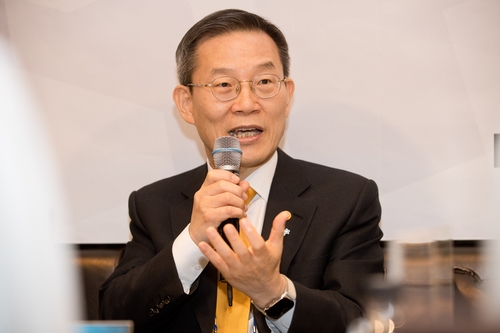Supply chain resilience is key reason behind S. Korea's decision to join IPEF
By Oh Seok-min
SEOUL, May 19 (Yonhap) -- South Korea said Thursday it has decided to join the U.S.-led new economic initiative, as it could help diversify and stabilize the country's supply chains amid fast-changing global trade circumstances.
President Yoon Suk-yeol is likely to announce the country's intention to join the Indo-Pacific Economic Framework (IPEF) during his summit with U.S. President Joe Biden in Seoul on Saturday.
Yoon's office said he will virtually attend a summit in Tokyo next week where Biden is poised to formally launch the IPEF.
"Going through the COVID-19 pandemic, how to strengthen the resilience of supply chains to better respond to such issues as climate change, the pandemic and supply chains has emerged as a key trade issue. This is why we are to participate in the IPEF," the Ministry of Trade, Industry and Energy said in a release.
The new platform is expected to help diversify and stabilize supply chains of semiconductors, clean energy, key minerals and other items, and deepening cooperation with major regional players will help strengthen corporate competitiveness and create more chances for overseas businesses, it added.
Participants of the new platform will likely be Japan, Australia, New Zealand and Singapore, and it will cover four key areas of fair trade, supply chain resilience, infrastructure and green technology, and tax and anti-corruption.
South Korea is heavily dependent on a handful of foreign nations for its supply of natural resources and major industry materials, which have often created supply shortages and other issues.
Last year, the country suffered from the supply crunch of urea solution, a key material needed to cut emissions from diesel vehicles, following China's export curbs on urea to ease domestic supply bottlenecks.
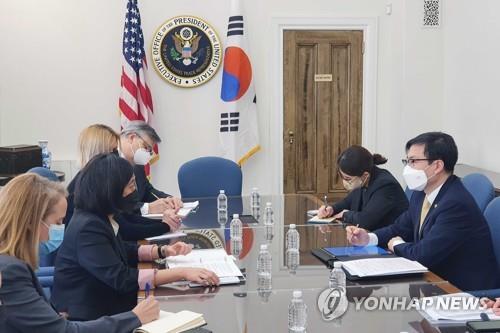
This file photo, provided by South Korea's trade ministry, shows South Korea's Trade Minister Yeo Han-koo (R) speaking with U.S. Trade Representative (USTR) Katherine Tai (2nd from L) during a meeting in Washington on March 4, 2022. (Yonhap)
As for concerns over possible impacts of the envisioned entry on relations with China, the ministry vowed to further enhance the economic relationship with China through various channels.
"We are vitalizing the RCEP agreement, which involves China, and now pushing to join the CPTPP. We will further cement economic cooperation with China and other nations through various channel," the ministry said.
The IPEF is often viewed as a countermeasure to the Beijing-led mega free trade deal of the Regional Comprehensive Economic Partnership (RCEP). It has 15 members -- South Korea, China, Japan, Australia, New Zealand and 10 ASEAN nations.
The Comprehensive and Progressive Agreement for Trans-Pacific Partnership (CPTPP) involves 11 Asia-Pacific nations, including Japan, Australia, Canada, New Zealand and Mexico, and South Korea officially announced its decision to accede to the pact last month.
On Thursday, Kim Tae-hyo, first deputy chief of the presidential National Security Office, said South Korea and China have a bilateral free trade agreement, and discussions are under way with China for a follow-up agreement.
"There is no need to see the IPEF simply as a hostile decoupling of supply chains between great powers," he told reporters.
graceoh@yna.co.kr
(END)
-
 BTS' RM to prerelease 'Come Back to Me,' music video directed by Lee Jung-jin of 'Beef'
BTS' RM to prerelease 'Come Back to Me,' music video directed by Lee Jung-jin of 'Beef' -
 Disney+ 'Uncle Samsik' aims to provoke thought with ambitious characters in turbulent times
Disney+ 'Uncle Samsik' aims to provoke thought with ambitious characters in turbulent times -
 N. Korea dismantles S. Korean building near shuttered Kaesong complex
N. Korea dismantles S. Korean building near shuttered Kaesong complex -
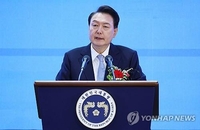 Yoon pledges to increase monthly senior basic pension benefit
Yoon pledges to increase monthly senior basic pension benefit -
 (Yonhap Interview) U.S. will do 'all' it can to back S. Korea in case of China's economic coercion: official
(Yonhap Interview) U.S. will do 'all' it can to back S. Korea in case of China's economic coercion: official
-
 BTS' RM to prerelease 'Come Back to Me,' music video directed by Lee Jung-jin of 'Beef'
BTS' RM to prerelease 'Come Back to Me,' music video directed by Lee Jung-jin of 'Beef' -
 Disney+ 'Uncle Samsik' aims to provoke thought with ambitious characters in turbulent times
Disney+ 'Uncle Samsik' aims to provoke thought with ambitious characters in turbulent times -
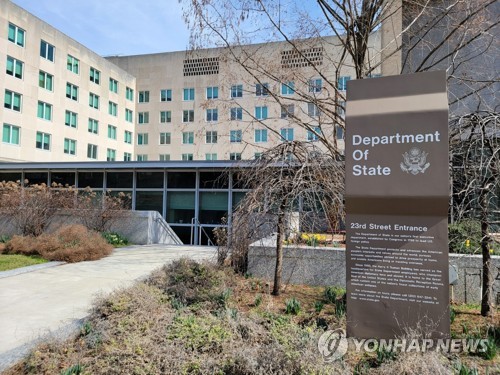 (Yonhap Interview) U.S. will do 'all' it can to back S. Korea in case of China's economic coercion: official
(Yonhap Interview) U.S. will do 'all' it can to back S. Korea in case of China's economic coercion: official -
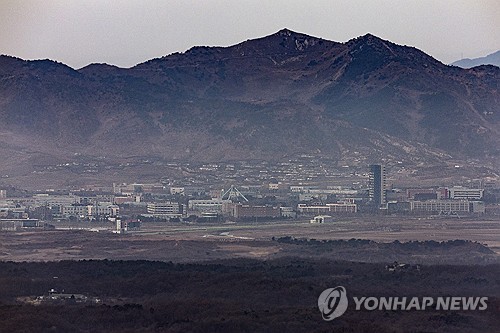 N. Korea dismantles S. Korean building near shuttered Kaesong complex
N. Korea dismantles S. Korean building near shuttered Kaesong complex -
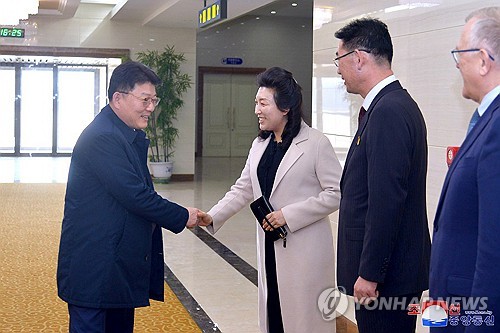 N. Korean economic delegation returns from Iran amid suspected military ties
N. Korean economic delegation returns from Iran amid suspected military ties
-
 BTS' RM to prerelease 'Come Back to Me,' music video directed by Lee Jung-jin of 'Beef'
BTS' RM to prerelease 'Come Back to Me,' music video directed by Lee Jung-jin of 'Beef' -
 (Yonhap Interview) Ex-Pentagon official stresses need for war plan rethink, swift OPCON transfer, USFK overhaul
(Yonhap Interview) Ex-Pentagon official stresses need for war plan rethink, swift OPCON transfer, USFK overhaul -
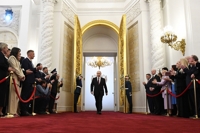 Top S. Korean envoy to Russia attends Putin's inauguration ceremony: Seoul official
Top S. Korean envoy to Russia attends Putin's inauguration ceremony: Seoul official -
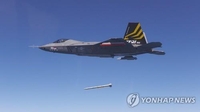 KF-21 fighter jet prototype to conduct 1st Meteor missile test
KF-21 fighter jet prototype to conduct 1st Meteor missile test -
 Foreign medical license holders to practice medicine in S. Korea amid prolonged doctors' walkout
Foreign medical license holders to practice medicine in S. Korea amid prolonged doctors' walkout















